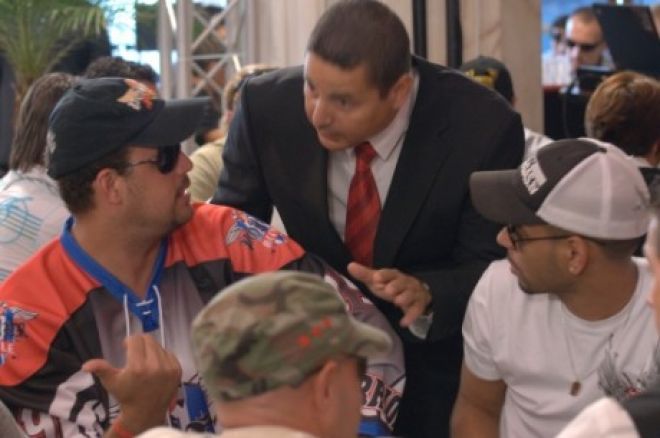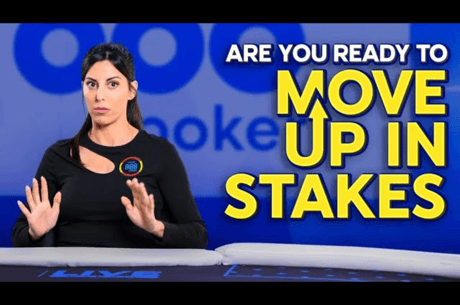Speaking Up: The Importance of Verbal Declarations

About a year ago I was at the Horseshoe Southern Indiana providing live updates for WSOP.com for the $1,675 buy-in World Series of Poker Circuit Main Event. As the field was whittled down to the final three players, a scenario took place that saw the third-place finisher eliminated from play due to a verbal miscommunication between the player and the dealer. The incident brought up a valuable lesson about making sure your verbal declarations at the table are clearly understood.
The scenario in question began just like any other hand. With the blinds at 25,000/50,000 with a 5,000 ante, Sean Lippel raised to 100,000 from his button. The small blind folded and eventual champion Zal Irani called from the big blind.
The two took a flop of 7?6?5? and Irani led out for 100,000. Lippel called to see the 2? hit the turn. Irani slowed with a check and Lippel moved 175,000 forward. Irani called and the river was the 8?. Irani announced an all-in bet which, when it was all said and done, turned out to have Lippel covered by just 20,000 in chips �� less than a small blind.
Lippel then quietly made a remark in which the loudest word was ��call,�� as he flashed his J?J? to the table.
Irani instantly tabled 9?5? for a winning straight. As the dealer began to cut down Irani��s stacks and count out his chips, Lippel protested �� this time speaking loudly �� insisting that the phrase he uttered was ��I can��t call.�� Since the only word both Irani and the dealer had heard was ��call,�� a heated discussion quickly erupted.
The floor was brought over and the players continued to argue over the situation. Irani��s argument was clear that both he and the dealer heard the key word of ��call�� and Lippel��s action was taken as such. Lippel defended what he claimed his words to have been and pleaded with an argument that was rooted in the logic of ��Why would I call with just a pair of jacks on that board?��
After play halted for over 15 minutes and tournament director Charlie Ciresi was reached for an official ruling, it was concluded that Lippel��s action would stand as a call. While this may seem like a very delicate decision to make, it was based on the fact that Lippel��s most audible word to the dealer and his opponent was ��call�� and that his hand had been tabled for everyone to see. This had been enough to qualify as accepted action after which Irani��s hand was also tabled. As mentioned, Irani had Lippel covered and he was eliminated from play in third place.
Lippel��s elimination was due mainly to a miscommunication on his part. There are several concepts that can be learned from his situation.
1. Always Make Your Intentions Clear to the Dealer
The dealer plays a pivotal role in any poker game, as it is his or her job to facilitate the action. Every decision and action that you make as a player must be known and acknowledged by the dealer.
Whether you choose to remain quiet during hands and let your actions speak for you or you choose to be talkative and verbalize each action, it is of paramount importance that the dealer knows exactly which course of action you choose to take. If your actions remain unclear to your opponents, they can and will clarify where the action stands with the dealer.
Always remember that the dealer acts not only as the facilitator of the game, but also as the liaison to the floor staff during times of confusion. Whenever floor staff are called on to make a judgment call, they receive all of the key information from the dealer as the dealer is the only party at the table with unbiased interests. All of which means it is especially important always to make your actions clear and unambiguous to the dealer.
2. Speak Up!
A poker room usually has several games going on at the same time. The voices of players combined with the riffling of chips can often lead to a loud atmosphere. As a player, it is your job to communicate effectively your intentions despite the noise surrounding you. Words and phrases can often be lost or misunderstood among the sounds of a typical poker room.
With this idea in mind, volume is everything if you choose to verbalize your decisions. In his award-winning sitcom, Seinfeld, Jerry was once forced to wear an embarrassing ��puffy shirt�� on national television because he misunderstood the request of a ��low-talker.�� Talking at an inaudible volume led to an unfortunate circumstance for his character and this lack of clarity in words could lead to an equally unfortunate circumstance in your poker game.
In Lippel��s case, both Irani and the dealer did not hear the entire statement that he claimed he said. If he had spoke at a louder level, the obvious intention of the statement ��I can��t call�� could have been heard by all parties, allowing him still to hang onto his tournament life.
3. Only Use Key Words When You Mean Them
At the poker table, both players and dealers are subconsciously tuned into hearing key words and phrases. ��Call,�� ��fold,�� and ��raise�� are generally words only spoken by players when they mean to do exactly those actions. Uttering a phrase like ��I can��t call�� uses a key word that people are used to hearing and changes it to mean exactly the opposite of what is generally perceived, which can understandably lead to confusion.
A simple solution for this is only to verbalize these key words when your intentions match their meaning. For example, let��s say Player A fires out a continuation bet on a flop and Player B, a rather chatty player who missed the flop, begins to talk aloud.
��I think you have nothing,�� Player B says with a laugh. A moment passes before he quietly remarks ��I should raise.��
The dealer, hearing the key word of ��raise,�� says ��raise�� aloud to confirm the action. Player A, who flopped a monster, immediately responds to this action by announcing ��All in�� (another key phrase in poker).
Now Player B has found himself in a situation where there has been significant action on what his perceived action was. Player B had no intention of raising, but failure to communicate clearly while using a key word saw further action on the hand. Now, instead of being able to fold and lose a minimal amount of chips, he will be forced to put in at least a min-raise before releasing his cards.
While much of this may seem like second nature, a quick lapse in judgment could have dire consequences to your bankroll or possible value as you run deep in a tournament. Situations such as this are easy enough to avoid as long as you remember to communicate clearly all of your actions at the poker table.
Get all the latest PokerNews updates on your social media outlets. Follow us on Twitter and find us on both Facebook and Google+!








